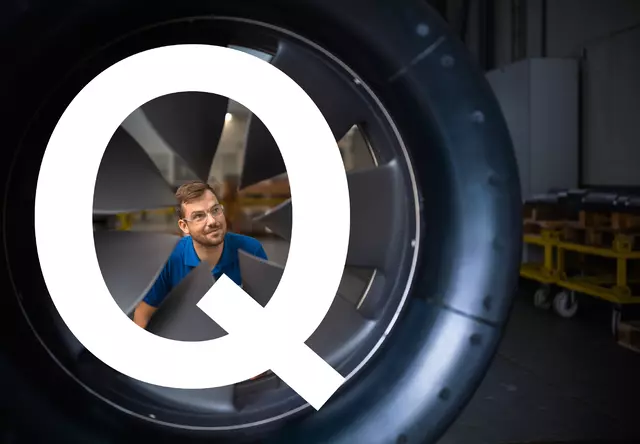Quality is the foundation of our lasting customer relationships
“Quality work,” “Quality has its price,” and “This is a real quality team” – we often use the word “quality” in everyday life to express our appreciation of special products or achievements. Objectively, quality only means “the individually and concretely defined property of a thing or a service.”
At Voith, however, it means much more than that. We have been shaping the markets in which we operate with our know-how and inventive spirit for over 155 years. Our quality consciousness is reflected not only in our products and processes but is also an integral component of our culture and forms the foundation of our lasting customer relationships.
Quality is multidimensional
Various dimensions have an effect on the quality of our products, solutions and services. The more precisely the supplied product or service matches the requirements, the higher the quality is. Differentiation can be made between the following:




Quality – a matter of attitude
Albert Einstein said, “Not everything that counts can be counted, and not everything that can be counted counts.” Quality management systems and processes can support and secure quality. However, in order to achieve outstanding quality, you need the commitment of employees.
By sharing our knowledge, seeing mistakes as opportunities, and celebrating our successes together, we continuously learn from and inspire one another across all functions. Dedicated employees deliver higher quality. But this can only happen if they know their work is valued and important.

Quality as a personal success

Successfully completing tasks is satisfying – the higher the quality, the more enhanced your self-confidence and the more pronounced your sense of achievement. And the greater your determination to do even better the next time.
Excellence and corporate culture
“Doing even better” is a quality aspiration that goes far beyond the measurable standard. We are entering “excellence” territory here. Excellence means a performance level that exceeds the measurable standard.
If you want to achieve excellence, you have to leave the comfort zone of the quality standard and enter the unknown. This starts with looking at things from your customer’s point of view and discovering possibilities that nobody – not even the customer – has thought of before. This customer experience has become a trademark of digital innovations. With this kind of quality, technology companies such as Voith can set themselves apart from everyone else in the traditional industry.
Excellence quality grows out of an excellent corporate culture. Voith promotes values such as teamwork, diversity, creativity, feedback, motivation, openness and community because these criteria are conducive to quality and excellent performance. By working in teams with different professional and cultural backgrounds and experiences, we can examine topics from different perspectives. This creates an environment marked by innovative strength and problem-solving expertise.

Quality and an open error culture
Only if you are allowed to make mistakes will you try new things. Besides having a “right the first time” philosophy, a quality company needs a tolerant error culture. The former refers to careful adherence to best practices, processes and standards; a tolerant error culture aims to unleash creative forces.
An important condition for constructively and objectively dealing with errors is the admission that mistakes happen – even at the highest level. The benefit of the mistake lies in the fact that you don’t make it a second time. If you learn from mistakes and use this information as a template for future improvements, you raise the general quality standard.

Key quality standards
Standards play an important role in quality management. They describe the properties that a product, service or process must possess. Standards thus deliver the objective evaluation criteria with which quality can be confirmed. For Voith, a number of different international standards are relevant, for example:
ISO
International Organization for Standardization (ISO) standards define requirements pertaining to the quality of products, execution of services, and management systems and associated processes. They are mainly relevant in the fields of technology, production and occupational safety and health.
ASME
ASME provides standards on topics including boilers and pressure vessels, power plants, elevators, construction machinery, pipelines and nuclear components.
EN
These are the European standards, or rules, that have been ratified by a European standardization committee. This work is performed by the European Committee for Standardization (CEN), the European Committee for Electrotechnical Standardization (CENELEC), and the European Telecommunications Standards Institute (ETSI).
GB
“GB” stands for “Guobiao,” which is Chinese for “national standard” and refers to standards applicable to the Chinese market.
DIN
These standards result from national, European or international standardization work. The standards are formulated in committees at DIN, the European standardization organizations CEN/CENELEC, and the international standardization organizations ISO/IEC according to defined principles as well as procedural and design rules.
From quality to customer experience
The customer’s quality experience has also changed. Quality defects are reported more quickly and publicly, and expectations regarding the product and the service are also changing.
Customers don’t just want to check off the quality box; they want to “experience” quality. “Customer experience” has become an important catchword today.






